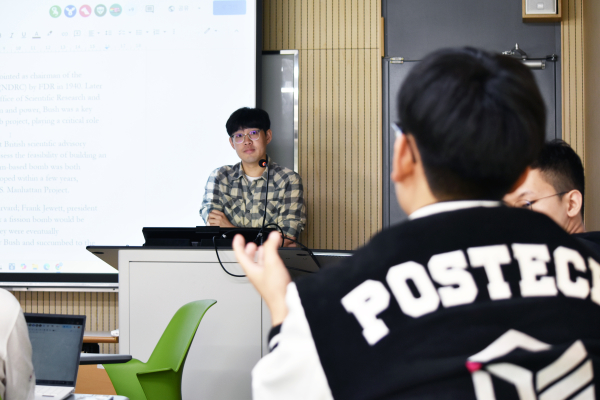
The university recently announced plans to expand English-medium instruction (EMI) across both major and general education courses. According to EAR, the university is conducting English lectures to nurture global leaders and strengthen the international competitiveness of our university. Since last October, the Committee for Internationalization of Education has been working on EMI policies, promotional strategies, and course scheduling, especially for students to be admitted in September. These EMI discussions seem to be checking the operation of the undergraduate curriculum before selecting new foreign students to enter next fall semester.
The Postech Times interviewed exchange students, a full-time undergraduate student, and professors about English courses at POSTECH.
According to interviews with exchange students, the biggest difficulty with current courses was a language barrier, despite the usage of English. Professors often use Korean phrases during courses or reply to students’ questions in Korean. Exchange students admitted that these 5 or 10 minutes of spoken Korean led to a learning deficit and feeling alienated. Some even changed course registration due to language use. While the syllabus states “English-only instruction,” international exchange students often face a full-time Korean course or are asked by professors to change their course registration. Exchange students also need approval from their home university for changing course registration. Due to the late realization that the course is conducted in Korean and the time difference, their course modification is often further delayed. About the university policy, exchange students claimed the necessity to extend the course correction period or specify the English usage rate as a percentage in the syllabus. The current system only specifies whether it is English or Korean. Segmenting levels will reduce confusion for non-Korean users. However, exchange students gave positive feedback on the overall English proficiency and pronunciation of the professors. Also, about the quality of courses provided.
The Korean student who took several basic required courses noted that difficulty and engagement varied by course format. In Basic English I, team discussions and vocabulary explanations encouraged students to use English more actively. However, in Calculus II, unfamiliar technical terms acted as a barrier to understanding.
“Words like ‘saddle’ or ‘torus’ were unfamiliar — something I’d understand right away in Korean.” The student said English lectures caused stress due to low comprehension and listening fatigue. In one case, poor delivery led them to drop the course. Still, they saw value in regular exposure to English, which reduced psychological barriers.
Another student shared a similar view. Despite difficulties understanding a lab-based class taught in English, they believed EMI supports global competitiveness. “These changes need gradual, structured support for both students and professors.”
Professor Jongsik Yi, who teaches Modern Society and Science in English, acknowledged that English lectures may be less effective in content delivery. So, he set the course’s learning goal at 70%, focusing on helping students use English as a learning tool. His discussion-based class allows Korean when necessary. He emphasized that the pace and scope of EMI expansion must be carefully managed. He also noted that the university is researching AI-generated subtitles to support a more gradual, flexible transition.
Some major-course professors argue that English lectures can reduce student interest and research participation, affecting long-term academic growth. Despite these challenges, upcoming changes may shift the dynamic. With international undergraduates joining in 2026, interest in EMI courses and labs may grow. Their presence could reinforce the role of EMI and spark greater engagement in research conducted in English, potentially revitalizing participation in related labs.
Most agree that EMI promotes global readiness. But flexibility and proper support, not forced change, are key to maintaining educational quality.


